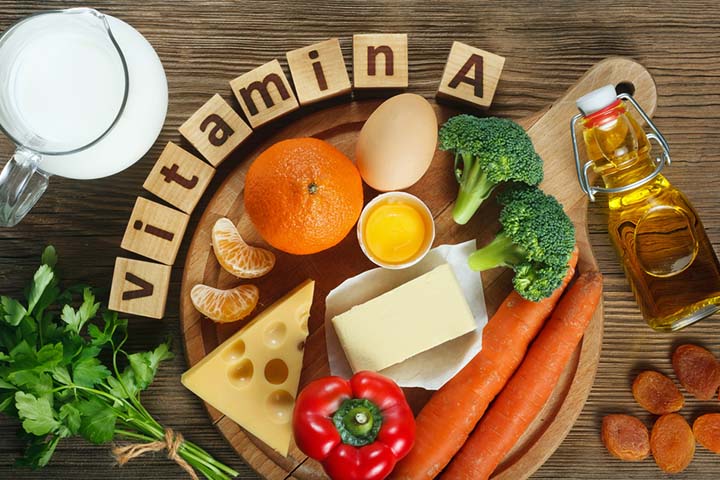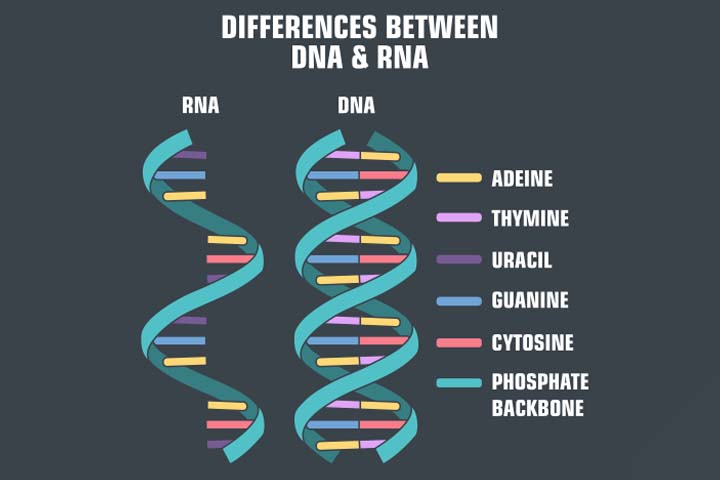Newborns are recommended to have only breast milk for at least the first six months. Experts suggest that the mothers’ milk includes essential vitamins for babies to meet their daily requirements. Continue reading this post as we discuss the importance of vitamins for your baby, the vitamins a breastfeeding mother requires, and the health benefits of these vitamins for the infant.
Why Are Vitamins Important For Your Baby?
Vitamins are vital for a baby’s growth and are a part of the baby’s daily nutritional requirement (1). Without vitamins, a baby runs the risk of deficiency diseases that can stunt his growth and delay developmental milestones.
Breast milk is the only source of vitamins to the baby during the first few months. Even after six months, when the baby starts eating solid food, breast milk can still be a significant source of vitamins.
What Essential Vitamins Does A Breastfeeding Infant Need?
All the vitamins play a crucial role in the healthy growth of an infant. The table lists the food sources of each vitamin and their recommended daily allowance (RDA) for a lactating mother.
| Vitamin | RDA | Food sources |
|---|---|---|
| A | 1,300μg/day (2) | Fish, eggs, liver, sweet potato, carrots, pumpkins, spinach, cheese, apricots, mangoes |
| B1 (Thiamin) | 1.4mg/day | Whole grains especially wheat and brown rice; meat, nuts, fish, soy, egg, legumes especially pulses, plant seeds, seed oils, green peas |
| B12 (Cobalamin) | 2.8μg/day | Fish, eggs, meat, shellfish, milk and dairy products. Note: Vitamin B12 is only found in animal food sources. |
| B2 (Riboflavin) | 1.6mg/day | Whole milk, whole wheat, brown rice, almonds, egg, spinach, soybeans, broccoli, meat, mushrooms |
| B3 (Niacin) | 17mg/day | Poultry meat, sesame seeds, beetroots, fish, sunflower seeds, peanuts, lentils, Lima beans, milk, eggs |
| B5 (Pantothenic acid) | 7 mg/day | Legumes including pulses, cauliflower, meat, sunflower seeds, fish, avocado, sweet potato, eggs, cheese, lentils |
| B6 (Pyridoxine) | 2 mg/day | Fish, fortified cereal, meat, lentils, plums, banana, lentils, carrots, spinach, potato |
| B9 (Folic acid/Folate) | 500 μg/day | Lentils, spinach, asparagus, turnip, beetroot, rice, orange, avocado, milk, wheat. Note: Vitamin B9 is found in all green leafy vegetables and root vegetables. |
| C (Ascorbic acid) | 120 mg/day | Guava, Indian gooseberry (Amla), kiwifruit, blackcurrant, orange, strawberries, tomato, broccoli, potato, spinach |
| Vitamin D | 15 μg/day | All fatty fish (sardines, tuna, mackerel, and salmon), egg yolk; vitamin D fortified infant formula, milk cereal & bread; vitamin D supplements |
| Vitamin E | 19 mg/day | Sunflower oil, grapeseed oil, safflower oil, soybean oil, olive oil, almonds, hazelnuts, peanuts, avocado, spinach |
| Vitamin H/Vitamin B7 (Biotin) | 35 μg/day | Meat, eggs, cheese, whole wheat, fish, cauliflower, avocado, raspberries, legumes, almost all nuts including walnut, peanut, and almonds |
| Vitamin K | 90 μg/day | Spinach, kale, broccoli, parsley, soybean oil, olive oil, cabbage, green lettuce, cauliflower, grapes |
mg=milligrams; μg = micrograms
Below, we tell you how each vitamin benefits the infant.
Health benefits:
1. Vitamin A:
- Vital for the development of vision, which includes both color and night vision.
- Helps in healthy formation of tissues, including skin and hair.
- Keeps the immune system healthy, which in turn provides protection against several illnesses (2).
2. Vitamin B1 (Thiamin)
- Thiamin is essential for the formation of the compound called adenosine triphosphate (ATP) that the body’s cells use as a source of energy (3).
- Several internal metabolic processes of the cells depend on vitamin B1 (4).
- Helps in the formation of healthy brain neuronsiXNerve cells, including those that are responsible for cognitive functionsiXThe brain’s ability to acquire, process, store, and retrieve information and memory formation.
3. Vitamin B12 (Cobalamin)
- Helps the body form new proteins that act as building blocks of the body (5). These proteins, in turn, help the baby grow.
- Vital for the good health of neurons (nerve cells). Healthy nerve cells eventually help in proper cognitive development.
- Vitamin B12 plays an essential role in the formation of DNA and RNA, which are the genetic materials of the cells.
4. Vitamin B2 (Riboflavin)
- Riboflavin plays a crucial role in ensuring absorption of iron by the body. A healthy intake of vitamin B2 helps the infant maintain optimum hemoglobin levels (6).
- Vitamin B2 works as an antioxidant that either minimizes or prevents cell damage thus ensuring cell health.
- It is vital for the healthy production of red blood cells, which in turn can help reduce the chances of anemia in infants.
5. Vitamin B3 (Niacin)
- Vitamin B3 is essential for keeping the nervous system healthy.
- Niacin helps in the production of different glands, such as the adrenal glandiXTriangular-shaped glands on kidneys that are responsible for the secretion of a variety of hormones, and other stress-related hormones in the body.
- Vitamin B3 helps the body reduce inflammation, which can be of significant benefit during infections and diseases.
6. Vitamin B5 (Pantothenic acid)
- Pantothenic acid is vital for the health of the red blood cells and different glands of the body.
- Keeps the digestive system healthy and helps the body to use vitamins, especially riboflavin.
- Vitamin B5 is known to help the body heal wounds faster and better, especially post surgery (7).
7. Vitamin B6 (Pyridoxine)
- Helps the body make neurotransmitters, which transmit signals from one neuron to another. It eventually helps the baby develop proper reflexes (8).
- Pyridoxine is essential for the development of the brain and spinal cord.
- Vitamin B6 plays a role in the formation of melatonin hormone, which regulates the sleep and wake cycle of the body.
8. Vitamin B9 (Folic acid/Folate)
- Supports the formation of DNA and RNA. It helps cells multiply faster.
- It helps in brain development and functioning as the babies are still learning to think and process information (9).
- Vital for the formation of red blood cells and the absorption of iron by the body (10).
9. Vitamin C (Ascorbic acid)
- Plays a role in the formation of collagen, the protein used to form the skin, hair, and blood vessels.
- Important for the healing of wounds and general repair of the body’s cells.
- Vitamin C has been shown to stimulate the production of leukocytes that are white blood cells essential to shield the body against pathogens.
10. Vitamin D
- Vitamin D is made by the liver from vitamin D2 or vitamin D3. Vitamin D3 is naturally produced by the skin when exposed to sunlight. Vitamin D2 is made from yeast and is usually available in the vitamin D drops for breastfed babies (11).
- The vitamin plays a role in bone mineralization, making bones become harder through the absorption of calcium and magnesium. Vitamin D is vital for the baby to develop stronger bones and ensure proper nutrient absorption.
- Helps in maintaining the functions of immune system cells, which in turn protect against pathogens.
- Adequate intake of vitamin D has shown to help the body better manage autoimmune diseases like eczemaiXA skin condition characterized by dry, itchy, and inflamed skin and Crohn’s diseaseiXA chronic condition causing inflammation of the digestive tract leading to abdominal pain, diarrhea, weight loss, and malnutrition (12). These are diseases that are widely noticed even in infants.
Vitamin D is added as a fortification to several foods like juice, cereal, bread, and milk. Vitamin D is also available in the form of over-the-counter supplements.
Bridget Teyler, a mother, birth doula, and childbirth educator, shares her approach to meeting her postpartum vitamin D needs. She explains, “I make an effort to spend 30 minutes under the sun every day, absorbing its rays through my skin. Additionally, I take vitamin D in capsule form. I provide my daughter with vitamin D along with her probiotic. Therefore, my daily routine includes 4000 IU of vitamin D and exposure to sunlight each day (i).”
Note:The body can naturally produce vitamin D on exposure to direct sunlight. However, the quantity of vitamin D in breast milk is never sufficient to meet the baby’s RDA unless the baby gets some sunlight exposure as well. Therefore, experts recommend a vitamin D supplementation of 400 IU/day (10μg/day) for the breastfeeding baby, starting from a few days after birth until the age of 12 months (13).
11. Vitamin E
- Vitamin E is important to keep the muscles healthy and also ensure they have an optimum range of movement (14).
- It strengthens cell-mediated immunity and helps the body fight infections better.
- The body needs vitamin E to make healthy red blood cells.
12. Vitamin H, also known as Vitamin B7 (Biotin)
- Essential to metabolize carbohydrates, amino acids, and fats in the body. These nutrients help the body grow and function normally.
- Infants need vitamin H for healthy skin. Also, adequate intake of vitamin H can help cure some infantile conditions like cradle cap, also known as seborrheic dermatitisiXA common skin condition that causes dandruff, scaly patches, and inflammation on the oily parts of the body.
- Biotin is vital for the overall good health of the skin, hair, and nails (15).
13. Vitamin K
- Helps the blood clot. In fact, the “K” in the name of the vitamin comes from its German name “Koagulations vitamin”, which means coagulation vitamin.
- Plays a role in ensuring ideal bone health and density.
- Good for the health of blood vessels and the circulatory system in general.
A healthy and balanced diet ensures that you get the daily allowances of vitamins. In case you have more questions about vitamins during breastfeeding, read our FAQs section next.
Vitamins for babies are essential to ensure your infant’s growth is on track. Breastmilk is the primary source of nutrition for the first six months of a baby’s life. Therefore, doctors may prescribe some vitamin supplements for the lactating mother to ensure the baby gets all the essential vitamins and nutrients via breast milk. A balanced diet and these dietary supplements can be beneficial for maternal health and the proper growth and development of the baby. However, you should only include these vitamins as a part of your diet if your doctor prescribes them.
Key Pointers
- Breast milk is crucial for the growth and development of babies and provides essential vitamins.
- Vitamin A in breast milk supports vision development, while Vitamin C boosts immunity.
- Vitamin D in breast milk strengthens bones and immunity, and Vitamin K aids blood clotting.
- Breast milk’s Vitamin E supports muscle building and enhances cell-mediated immunity.
- B complex vitamins in breast milk have distinct roles in metabolism, DNA formation, and cell signaling.
- A balanced diet and adequate supplementation help breastfeeding mothers obtain these beneficial vitamins.
While breastfeeding you might wonder what vitamins you should be consuming to ensure that the nutritional needs of both you and your baby are met. Watch this informative video to learn about important nutrients during this time.















